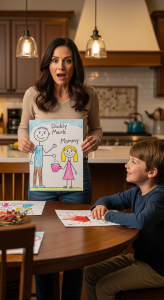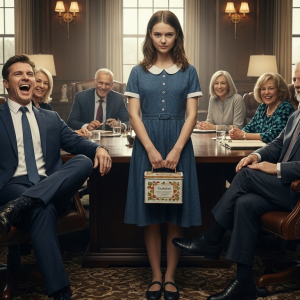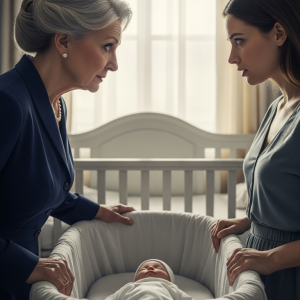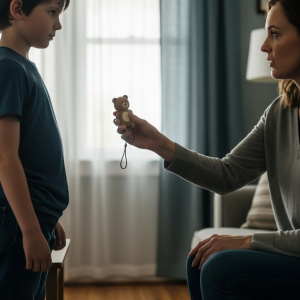Clara felt the warmth of the evening sun on her face as she stood on the porch of her new home. It was a beautiful two-story house with a sprawling lawn, nestled in a quiet, leafy suburb. After the sudden, tragic loss of her first husband two years ago, she never thought she would find this kind of peace again. And it was all because of Mark.
Mark was a dream. He was handsome, gentle, and endlessly patient. He had stepped into her life and the life of her five-year-old son, Leo, with a grace that felt like a miracle. He was the perfect husband, the perfect stepfather. He had taken her grief and carefully, lovingly, built a haven around it.
There were, of course, adjustments. She often felt a profound exhaustion in the mornings, a bone-deep weariness that was hard to shake. Sometimes, the edges of the previous evening felt fuzzy, like a half-remembered dream.
“It’s just the stress of the new life, my love,” Mark would say, wrapping his strong arms around her. “Your body and mind are finally allowing themselves to relax. You’ve been carrying so much for so long.” It made perfect sense.
He was so attentive, especially about her well-being. He was a firm believer in routine and rest. Every night, without fail, he would bring her a cup of his special chamomile and lavender tea, brewed to perfection. “To ensure my beautiful wife gets her deep, restorative sleep,” he’d say with a heart-melting smile.
His own past was a sad, quiet story. He told her he was an orphan, raised in a series of foster homes, with no family to speak of. It explained his fierce devotion to building a family of his own with her and Leo. It also made him a man without a history, a man whose life began the day he met her. She saw it as romantic. A clean slate.
The only unsettling moments were the small, inexplicable “accidents.” A few weeks ago, she’d slipped on a freshly mopped step he had forgotten to tell her about, tumbling and catching herself just before a nasty fall. He had been there in an instant, scooping her up, his face a mask of concern. Just last week, her hairdryer had shorted out in her hand with a terrifying spark. Mark had rushed in, wrestling it from her grasp, playing the hero. In both instances, his quick action had saved her from harm. She felt not fear, but a surge of gratitude for her watchful, protective husband.
This evening felt particularly perfect. The scent of roasting chicken filled the warm kitchen air. Leo was sitting at the large oak table, his tongue sticking out in concentration as he worked with his box of crayons. Mark was in the living room, on a business call.
“I’m finished, Mommy!” Leo announced, holding up his masterpiece with a proud grin.
Clara wiped her hands on her apron and came over to inspect it. It was a charming, childish drawing of their family. There was Clara with her long brown hair, Leo as a smaller stick figure beside her, and Mark, tall and smiling, on her other side. They were all holding hands under a giant, smiling sun.
“Oh, sweetie, this is beautiful! I’m going to put this right on the…” Her voice trailed off. She leaned in closer, her brow furrowing. There was another detail in the drawing, a small but jarring one. Next to the figure of Mark, there was a tiny white circle, hovering right above her own crudely drawn glass of water.
“What’s this little thing here, honey?” she asked, pointing to the white circle.
Leo beamed, proud to explain the details of his art. “That’s the candy!” he said happily.
Clara felt a flicker of confusion. “The candy? What do you mean?”
“Daddy Mark put the candy in your water for you,” Leo explained, his voice full of the simple, unshakeable logic of a five-year-old. “While you were cooking. He said it was our special secret to help Mommy sleep good.”
The kitchen suddenly felt ice-cold. An arctic chill snaked up Clara’s spine, prickling her skin. A secret. A special secret. She forced a smile, her heart beginning a frantic, galloping rhythm against her ribs.
“Did he, now?” she said, her voice strained. “And what did this… candy… look like?”
“It was little and white,” Leo said, shrugging. “He broke it up with his big key from his pocket. He told me not to tell you, because it’s a surprise.”

The buzzing in her ears was so loud she could barely hear the sound of Mark ending his call in the other room. Her mind raced, connecting a terrifying constellation of dots: the morning exhaustion, the memory gaps, Mark’s obsession with her sleep. The haven he had built for her suddenly felt like a cage.
“Everything alright, my love?” Mark asked, entering the kitchen. He kissed the top of her head, his familiar scent of sandalwood now seeming suffocating. “Dinner smells incredible.” He seemed perfectly normal. The loving husband.
Clara’s mind was a maelstrom of panic, but years of practiced motherhood kept her expression placid. She served the dinner, her hands trembling so badly she nearly dropped a plate. She complimented Leo on his drawing, placing it on the fridge with a magnet, her movements stiff and robotic.
Later that evening, as they were winding down in the living room, Mark appeared from the kitchen, just as he always did. He was holding her favorite ceramic mug, steam wafting from the top.
“Here you go, my darling,” he said, his voice a warm, soothing caress. “Your chamomile tea. Drink up. You need a good, deep sleep tonight.”
She took the mug, her fingers brushing against his. His hand was warm and steady. Hers was ice-cold and shaking. She looked into his eyes, searching for a flicker of something—malice, deceit, anything—but found only the same adoring gaze he always gave her. Was she going crazy? Was Leo mistaken?
She raised the mug to her lips, her heart hammering against her ribs. She tilted it back, making a loud gulping sound, but let only a tiny amount of the liquid touch her tongue. She held the rest in her mouth, the warmth of it sickening. The taste was instantly, horribly wrong. Underneath the faint sweetness of honey and chamomile was a bitter, chalky grit. It was the unmistakable, acrid taste of a crushed, undissolved pill.
“Excuse me,” she mumbled, getting up quickly. She walked to the downstairs bathroom, her knees weak. Locking the door, she leaned over the sink and spat out the mouthful of tea. The gritty residue coated the porcelain basin. It wasn’t a child’s fantasy. It was real.
He was drugging her. The man she loved, the man she trusted with her life and the life of her child, was poisoning her every night. The test wasn’t just a test. It was a calibration.
Fear was a living thing inside her, a cold, writhing serpent in her gut. But as the initial shock subsided, it was replaced by a sharper, fiercer instinct: survival. She couldn’t confront him. He would deny it. He would call her hysterical. And then he would simply be more careful.
She went back to the living room, feigned a yawn, and told him the tea was already making her sleepy. She kissed him goodnight, the touch of his lips on her skin feeling like a spider’s kiss. She went upstairs, her mind racing. She had to know who he was. She had to know what he was.
An hour later, she lay in their bed, her breathing deep and even, mimicking the slumber he so desperately wanted for her. Mark came in, listened to her breathe for a long, terrifying moment, and then went to his side of the bed. Soon, his own breathing settled into the slow, rhythmic cadence of genuine sleep.
Clara waited. Every creak of the house, every rustle of the sheets, was magnified into a threat. When she was certain he was deeply asleep, she slipped out of bed. The real Mark, she suspected, was not the man who lay beside her. The real Mark was hidden in the one place he kept locked: his home office. The key he’d used to crush the “candy.” She had seen it on his keychain a hundred times.
With hands that shook so badly she could barely function, she gently lifted his keys from the nightstand. She crept downstairs, the floorboards groaning under her bare feet. The key slid into the office door lock with a soft click that sounded like a gunshot in the silent house.
The office was neat, organized, masculine. A desk, a computer, a bookshelf. It all looked normal. She started with the desk drawers, her search growing more frantic. Nothing. Then she saw it. A heavy, fire-proof lockbox tucked away in the bottom of the closet. She tried the keys from his keychain. The third one fit.
Inside were not business papers or financial documents. There was a collection of fake IDs, all with Mark’s picture but different names. There was a passport under the name ‘Martin Peterson.’ And beneath it all, a thick file of yellowed newspaper clippings. Her blood ran cold as she read the first headline, from a Denver newspaper dated seven years ago.
“TRAGIC ACCIDENT CLAIMS HEIRESS. Amelia Weatherly, 34, Dies After Fall at Family Home.” The article detailed how the wealthy widow had apparently lost her footing and fallen down a grand staircase. She was survived by her grieving new husband of six months, Martin Peterson.
Her hands trembling, she picked up the next one, from a Chicago paper, dated four years ago.
“WIDOW’S DEATH RULED ACCIDENTAL OVERDOSE. Rose Carmichael, 42, Found by Devastated Husband.” The story described how the recently remarried philanthropist had accidentally taken too many of her prescribed sleeping pills. Her vast fortune was left to her loving husband of less than a year, a man named Jonathan Finch. A photo accompanied the article. It was Mark.
She was not his loving wife. She was the next name in a series. Amelia, Rose, Clara. The fall down the stairs. The sleeping pills. The recent “accidents” weren’t accidents. They were rehearsals.
Clara didn’t scream. A strange, glacial calm descended upon her. She was looking at her own obituary. He was a monster, a black widower, and he was sleeping soundly in her bed.
She couldn’t stay. She couldn’t wait until morning. His “test” might be over. Tonight could be the night he decided the dosage was perfect, the night he would carry her limp body to the top of the stairs.
Working on pure adrenaline, she began to move. She carefully photographed every article, every fake ID, with her phone. She took the mug from the bathroom, the dregs of the tea still inside, and sealed it in a plastic bag. She found the vial of pills hidden in his desk drawer—the same sleeping medication prescribed to Rose Carmichael in the newspaper article. She took that too.
Then she went upstairs, moving like a ghost. She crept into Leo’s room. He was fast asleep, his face peaceful and innocent. The little boy who had, with a simple crayon drawing, saved her life. She gently lifted him from his bed, his warm, sleeping body a comfort against her own terror.
She packed a single bag. Clothes, her wallet, the evidence. She took one last look at the master bedroom, at the man lying there, a predator disguised as a prince. She didn’t feel sadness or loss. She felt a cold, hard resolve.
She carried her son down the stairs, out the front door, and into the cold, dark night. She didn’t look back. She got into her car, locked the doors, and drove away from the beautiful house that had become her potential tomb. She didn’t drive to a friend’s house. She didn’t drive to a hotel. She drove straight to the one place that could fight a monster like him. She drove to the police station.
Detective Harding listened to Clara’s story with the weary skepticism of a man who had heard a thousand domestic disputes. But as she spoke, his posture straightened. When she placed the plastic bag containing the teacup, the vial of pills, and the phone with the photos of the articles on his desk, his expression shifted from skepticism to intense focus.
The final piece of evidence she presented was a piece of paper, folded carefully. She smoothed it out on the desk. It was Leo’s drawing.
“My son drew this yesterday evening,” she said, her voice steady now. “He called this… a ‘candy.’ He said his Daddy Mark put it in my water as a secret.”
Harding stared at the childish drawing. The smiling stick figures, the bright sun, and the one small, terrifying detail that had unraveled a web of murder. This wasn’t a “he said, she said.” This was something else entirely. He looked from the drawing to the newspaper clippings on her phone, his mind connecting the “accidental” fall of one wife with the “accidental” overdose of another. He realized he wasn’t looking at a domestic dispute. He was looking at the work of a possible serial killer.
The arrest was made just after dawn. Mark was taken from the house, still in his pajamas, his face a mask of shocked confusion, his performance as the worried husband perfect to the very end.
The case became a media sensation. The “Perfect Husband Killer,” the papers called him. The stories of Amelia and Rose were re-examined, their bodies exhumed. The evidence of long-term poisoning was found. Mark’s entire criminal enterprise, his meticulously crafted identity, was laid bare for the world to see, all because he underestimated the observant eyes of a five-year-old boy.
One year later.
The sunlight streamed into a bright, airy apartment in a city hundreds of miles away. The walls were painted a cheerful yellow. Clara was on the floor, helping Leo build a towering city out of wooden blocks. She was laughing, a sound that was full and genuine.
She had sold the house, erasing the last physical connection to that nightmare. The long legal battle was over. Mark—or whatever his real name was—would spend the rest of his life in prison.
The horror of what she had endured had not broken her; it had forged her into something stronger. She had discovered a resilience she never knew she possessed. With a portion of the inheritance from her first husband—the money that had made her a target—she established a foundation. It was named after Amelia Weatherly and Rose Carmichael. Its purpose was to provide legal aid and resources for women trying to escape dangerous domestic situations, to help them see the red flags she had missed.
On the wall in their new living room, in a simple, elegant frame, hung Leo’s drawing. It wasn’t a reminder of the monster or the terror. It was a monument. It was a symbol of the fierce, innocent love that had cut through the darkest of deceptions. It was a portrait of a family, not the one she had thought she was building, but the one that had survived, stronger and more precious than ever. It was the picture of a little boy who, with a simple crayon, had saved the world for his mother.




